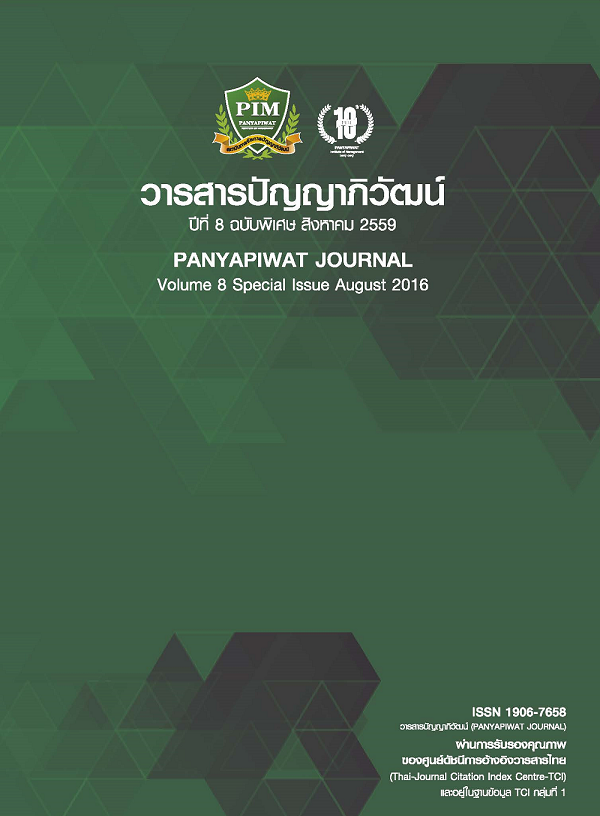การสร้างจิตวิญญาณของการเป็นผู้ประกอบการด้วยรูปแบบการศึกษาจากการปฏิบัติงานจริง
Main Article Content
บทคัดย่อ
ภายใต้บริบทของระบบเศรษฐกิจที่เปลี่ยนแปลงตามกระแสโลก ต้องอาศัยความร่วมมือจากทุกภาคส่วนเป็นตัวขับเคลื่อนหลักให้เกิดการเติบโต สร้างความมั่งคั่งและสร้างงาน เพื่อก่อให้เกิดความได้เปรียบในเวทีการแข่งขันระดับนานาชาติและความยั่งยืนทางธุรกิจ สิ่งที่ต้องคำนึงถึงอันดับแรกคือ ทรัพยากรมนุษย์ โดยเฉพาะในแผนแม่บทการพัฒนาอุตสาหกรรมไทย พ.ศ. 2555-2574 ระบุว่า การพัฒนาผู้ประกอบการไทยโดยภาพรวมนั้นต้องมีการเพิ่มจํานวนและสร้างความเข้มแข็งของผู้ประกอบการควบคู่กันไป โดยเฉพาะในกลุ่มของผู้ประกอบการที่เป็นวิสาหกิจขนาดกลางและขนาดย่อม (SMEs) อย่างไรก็ตามในการพัฒนาผู้ประกอบการไทยรุ่นใหม่ให้มีความรู้ ทักษะ และจำนวนที่เพียงพอต่อการเติบโตของกลุ่มอุตสาหกรรมที่เป็นอยู่ ณ ขณะนี้ ต้องอาศัยความร่วมมือระหว่างสถาบันการศึกษา หน่วยงานภาครัฐ และสถานประกอบการภาคเอกชน และที่สำคัญไปกว่านั้นก็คือ การสร้างความเชื่อมโยงด้านทักษะที่จำเป็นในการประกอบอาชีพของสถานประกอบการต่างๆ เข้ากับหลักสูตรและแนวทางในการจัดการเรียนการสอน ซึ่งในปัจจุบันมีระบบการศึกษาที่เรียกว่าการศึกษาจากการปฏิบัติงานจริง (Work-based Education) เพื่อสร้างบัณฑิตให้มีความพร้อม สามารถทำงานได้ทันทีเมื่อสำเร็จการศึกษา และการมีจิตวิญญาณของผู้ประกอบการในการประกอบธุรกิจของตนเองให้ประสบความสำเร็จอย่างรวดเร็ว ตามความรู้ความสามารถ รวมถึงทักษะที่สั่งสมจากประสบการณ์ตรง ซึ่งสอดคล้องตามกรอบแนวคิดในการผลิตและพัฒนาผู้ประกอบการไทยรุ่นใหม่ของยุคเศรษฐกิจดิจิทัล
According to the economic system context changed by global current, the required cooperation among all sectors was a key driver for the growth, wealth and job creation. These brought an advantage in the international competition and sustainable business. The first important thing was the human resource development (HRD). The national industrial development master plan 2555-2574 identified that the overall of HRD must increase the number and strengthen the entrepreneur in the same time, especially a group of small and medium-sized enterprises (SMEs). However, to develop entrepreneurial knowledge and skill for the new Thai generation including sufficient number for the today industrial growth, it required cooperation among the educational institutions, government and private sectors. They chiefly integrated all skills needed for future careers to the curriculum and teaching-learning method. A present education model called Work-based Education: WBE aimed to produce ready-to-work graduates after their graduation immediately. Besides, to cultivate the entrepreneurial spirit, graduates will succeed in their own business quickly by wisdom and skills gained from their direct experiences. As discussed above, it was in accordance with the framework of the new entrepreneur production and development in Digital Economy Age.
Article Details
“ข้าพเจ้าและผู้เขียนร่วม (ถ้ามี) ขอรับรองว่า บทความที่เสนอมานี้ยังไม่เคยได้รับการตีพิมพ์และไม่ได้อยู่ระหว่างกระบวนการพิจารณาลงตีพิมพ์ในวารสารหรือแหล่งเผยแพร่อื่นใด ข้าพเจ้าและผู้เขียนร่วมยอมรับหลักเกณฑ์การพิจารณาต้นฉบับ ทั้งยินยอมให้กองบรรณาธิการมีสิทธิ์พิจารณาและตรวจแก้ต้นฉบับได้ตามที่เห็นสมควร พร้อมนี้ขอมอบลิขสิทธิ์บทความที่ได้รับการตีพิมพ์ให้แก่สถาบันการจัดการปัญญาภิวัฒน์หากมีการฟ้องร้องเรื่องการละเมิดลิขสิทธิ์เกี่ยวกับภาพ กราฟ ข้อความส่วนใดส่วนหนึ่งและ/หรือข้อคิดเห็นที่ปรากฏในบทความข้าพเจ้าและผู้เขียนร่วมยินยอมรับผิดชอบแต่เพียงฝ่ายเดียว”
เอกสารอ้างอิง
กระทรวงอุตสาหกรรม. (2554). แผนแม่บทการพัฒนาอุตสาหกรรมไทย พ.ศ. 2555-2574. กรุงเทพฯ: สำนักงานเศรษฐกิจอุตสาหกรรม.
ฉัตรยาพร เสมอใจ, ฐิติรัตน์ มีมาก และคมกฤช ปิติฤกษ์. (2552). การจัดการธุรกิจขนาดย่อม (พิมพ์ครั้งที่ 1). กรุงเทพฯ: บมจ. ซีเอ็ดยูเคชั่น.
ชมัยพร วิเศษมงคล. (2553). ผู้ประกอบการในยุคเศรษฐกิจสร้างสรรค์.สืบค้นเมื่อ 27 เมษายน 2559, จาก http://www.manager.co.th/iBizchannel
ทศพล แก้วนุช. (30 เมษายน 2559). สัมภาษณ์. เจ้าของกิจการร้านอาหารทะเล.
บุริม โอทกานนท์. (2557).คุณลักษณะของผู้ประกอบการที่ประสบความสำเร็จ. สืบค้นเมื่อ 27 เมษายน 2559, จาก http://www.cmmu.mahidol.ac.th
พรพล พลอยธรรมชาติ. (6 เมษายน 2559). สัมภาษณ์. ผู้ช่วยผู้จัดการแผนกบริหารผลิตภัณฑ์.รักษ์พล สงัด. (6 เมษายน 2559). สัมภาษณ์. เจ้าของกิจการสินค้า DIY.
เลิศชัย สุธรรมานนท์. (ม.ป.ป.). สถาบันการจัดการปัญญาภิวัฒน์กับการจัดการศึกษาแบบ Work Based Education.สืบค้นเมื่อ 19 เมษายน 2559, จาก http://www.mua.go.th/users/he-commission
วิมลกานต์ โกสุมาศ. (2558). คว้าโอกาสทองยุคดิจิทอลบูม. SMEs Today, 12(101), 26-27.
วีระศักดิ์ สุตัณฑวิบูลย์. (2557). ผู้ประกอบการไทยใน “ยุคเศรษฐกิจดิจิทัล”.สืบค้นเมื่อ 27 เมษายน 2559, จาก http://www.prachachat.net/news
สำนักงานคณะกรรมการการอุดมศึกษา. (2550). คู่มือการประกันคุณภาพการศึกษาภายในสถานศึกษาระดับอุดมศึกษา. กรุงเทพฯ: ภาพพิมพ์.
สุชาติ ไตรภพสกุล.(2557).“คนไทยอยู่ตรงไหนในดัชนีเถ้าแก่เอเชีย”.สืบค้นเมื่อ 27 เมษายน 2559, จาก http://www.forbesthailand.com/commentaries-detail.php?did=143
Frederick, H. H., O’Connor, A. J. & Kuratko, D. F. (2010). Entrepreneurship: Theory, Process, Practice.China: China Translation & Printing Services.
Johnson, K. D. (2013).The Entrepreneur mind. USA: Johnson Media INC.
Julien, P. A. (2007). A Theory of Local Entrepreneurship in the Knowledge Economy. United Kingdom: Edward Elgar Publishing Limited.
Marenzi, C. (n.d.). Training Young Entrepreneurs to Head the Family Business: A Work-based Learning Program. Retrieved April 19, 2016, from http://www.eucen.eu/sites/default/files/TRAININGYOUNGENTREPRENEURS.pdf
Pierce, S. (2008). “Spirit of the Entrepreneur”. Retrieved April 19, 2016, from http://www.entrepreneur.com/ article/ 190986
The McDonough Center for Leadership and Business. (2015). DRIVE Camp. Retrieved April 19, 2016, from https://webapps.marietta.edu /~lead/?q=node/312
Young Entrepreneurs Consortium. (n.d.). Inspiring Young mind for Great Future. Retrieved April 19, 2016, from http://www.battelleforkids.org/docs/defaultsource/publications/yec_the_material_out_of_which_countries_are_made.pdf?sfvrsn=2
Translated Thai ReferencesKaewnuch, T. (2016, April 30). Interview. The Entrepreneur of seafood restaurant. [in Thai]
Kosumard, V. (2015). Take the opportunity of Digital Booming. SMEs Today, 12(101), 26-27. [in Thai]
Ministry of Industry. (2011). The master plan for Thailand industrial development 2012-2031. Bangkok: Office of Industrial Economics. [in Thai]
Office of Higher Education Committee. (2007). A Guide to Quality Assurance in Higher Education. Bangkok: Parppim. [in Thai]
O-thakanon, B. (2014). The Successful Entrepreneur Characteristics. Retrieved April 27, 2016, from http://www.cmmu.mahidol.ac.th [in Thai]
Ploythammachart, P. (2016, April 6). Interview. Assistant Manager.
Samaorjai, C., Memak, T. & Pitiruaek, K. (2009). Small Business Management (1st ed.). Bangkok: SE–EDUCATION. [in Thai]
Sa-ngad, R. (2016, April 6). Interview. The Entrepreneur of DIY product Shop. [in Thai]
Sutantawibul, V. (2014). Thai Entrepreneur in Digital Economy.Retrieved April 27, 2016, from http://www.prachachat.net/news [in Thai]
Suthanmanon, L. (n.d.). Panyapiwat institute of Management and Work Based Education. Retrieved April 19, 2016, from http://www.mua.go.th/users/he-commission [in Thai]
Triphopsakul, S. (2014). “Thai Where is The Rich Index in Asia”.Retrieved April 27, 2016, from http://www.forbesthailand.com/commentaries-detail.php?did=143 [in Thai]
Visesmongkol, C. (2010). The Entrepreneur in The Creative Economy. Retrieved April 27, 2016, from http://www.manager.co.th/iBizchannel [in Thai]


